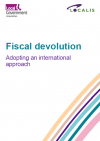The Local Government Association (LGA) has long called for genuine devolution to local areas. We believe that greater fiscal freedom, the power to raise more money locally and have greater control over how this money is spent in local areas is a crucial part of this process.
COVID-19 has brought into sharp relief the financial challenges facing English local government. It has also underlined the transformative role councils can play in supporting their communities and economies if they are given the freedom to get on and deliver.
The Local Government Association (LGA) has long called for genuine devolution to local areas. We believe that greater fiscal freedom, the power to raise more money locally and have greater control over how this money is spent in local areas is a crucial part of this process.
As this report sets out, the UK is an international outlier, one of the most fiscally centralised countries in the developed world. Local authorities in Germany, Switzerland and Holland can access a diverse range of revenue sources. They are also able to adjust and introduce local levies in consultation with their residents and businesses, innovating and diversifying their tax base in response to new public priorities, such as responding to climate change, and new forms of economic activity.
By contrast councils in England are only able to levy two taxes: council tax and business rates. Both are subject to significant
intervention and control by Whitehall and both stand increasingly exposed in the light of long-term changes in home ownership and business composition, such as the rise of e-commerce and the growth in microbusinesses.

- Published by:
-
LGA
- Reference code:
-
4.104
